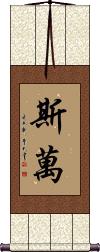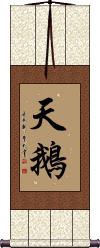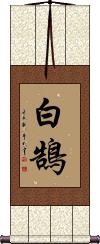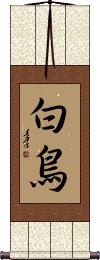Many custom options...
And formats...

Swan in Chinese / Japanese...
Buy a Swan calligraphy wall scroll here!
Personalize your custom “Swan” project by clicking the button next to your favorite “Swan” title below...
Swan
Swan
White Swan
Swan / White Crane
白鳥 is the Japanese Kanji and old Korean Hanja title for white swan (Cygnus Bechstein).
The title literally means white-feathered bird. This title can also be used to refer to a white crane.
This can also be the Japanese surname, Hakuchou.
Great Aspirations / Ambition
鴻鵠之誌 is a Chinese proverb that implies that having grand ambitions also means that others will not understand your great expectations and ideas.
Though the actual words come from a longer saying of Confucius, which goes, “The little swallows living under the eaves wouldn't understand the lofty ambitions of a swan (who flies far and wide).”
This Confucius quote has led to this idiomatic expression in China that means “think big.” What you'd be saying is “The lofty ambitions of a swan.”
Note that Chinese people sometimes refer to the little swallow as one who does not “think big” but is, instead, stuck in a rut or just leading a mundane life. Therefore, it's a compliment to be called a swan but not a good thing to be called a swallow.
Not the results for swan that you were looking for?
Below are some entries from our dictionary that may match your swan search...
| Characters If shown, 2nd row is Simp. Chinese |
Pronunciation Romanization |
Simple Dictionary Definition |
天鵝 天鹅 see styles |
tiān é tian1 e2 t`ien o tien o |
More info & calligraphy: Swan |
白鳥 see styles |
hakuchou / hakucho はくちょう |
More info & calligraphy: Swan / White Crane |
白鵠 白鹄 see styles |
bái hú bai2 hu2 pai hu akiko あきこ |
More info & calligraphy: White Swan(female given name) Akiko swan |
スワン see styles |
suwan スワン |
More info & calligraphy: Swann |
鵠 鹄 see styles |
hú hu2 hu kugui くぐい |
swan (1) (See 白鳥・はくちょう・1) swan; (2) bullseye; (place-name) Kugui goose |
雁門 雁门 see styles |
yàn mén yan4 men2 yen men ganmon |
teachings of the swan [king] |
飛鴻 飞鸿 see styles |
fēi hóng fei1 hong2 fei hung hikou / hiko ひこう |
swan goose; (fig.) letter; message (given name) Hikou |
鴈門 see styles |
yàn mén yan4 men2 yen men |
teachings of the swan [king] |
鴻雁 鸿雁 see styles |
hóng yàn hong2 yan4 hung yen kougan / kogan こうがん |
(bird species of China) swan goose (Anser cygnoides) (poetic term) wild geese; large geese and small geese |
鴻鵠 鸿鹄 see styles |
hóng hú hong2 hu2 hung hu koukoku / kokoku こうこく |
swan; person with noble aspirations (1) (See 燕雀・1) large bird; (2) (See 燕雀・2) great person; magnanimous person; hero |
鵾弦 鹍弦 see styles |
kūn xián kun1 xian2 k`un hsien kun hsien |
pipa strings, made from sinews of large crane or swan 鵾雞|鹍鸡[kun1 ji1] |
黒鳥 see styles |
kurodori くろどり |
black swan (Cygnus atratus); (place-name) Kurodori |
大天鵝 大天鹅 see styles |
dà tiān é da4 tian1 e2 ta t`ien o ta tien o |
(bird species of China) whooper swan (Cygnus cygnus) |
大梵天 see styles |
dà fàn tiān da4 fan4 tian1 ta fan t`ien ta fan tien Daibon ten |
Mahābrahman; Brahma; 跋羅吸摩; 波羅賀磨; 梵覽摩; 梵天王; 梵王; 梵. Eitel says: "The first person of the Brahminical Trimūrti, adopted by Buddhism, but placed in an inferior position, being looked upon not as Creator, but as a transitory devatā whom every Buddhistic saint surpasses on obtaining bodhi. Notwithstanding this, the Saddharma-puṇḍarīka calls Brahma 'the father of all living beings'" 一切衆生之父. Mahābrahman is the unborn or uncreated ruler over all, especially according to Buddhism over all the heavens of form, i.e. of mortality. He rules over these heavens, which are of threefold form: (a) Brahma (lord), (b) Brahma-purohitas (ministers), and (c) Brahma-pāriṣadyāh (people). His heavens are also known as the middle dhyāna heavens, i.e. between the first and second dhyānas. He is often represented on the right of the Buddha. According to Chinese accounts the Hindus speak of him (1) as born of Nārāyaṇa, from Brahma's mouth sprang the brahmans, from his arms the kṣatriyas, from his thighs the vaiśyas, and from his feet the śūdras; (2) as born from Viṣṇu; (3) as a trimūrti, evidently that of Brahma, Viṣṇu, and Śiva, but Buddhists define Mahābrahma's dharmakāya as Maheśvara (Śiva), his saṃbhogakāya as Nārāyaṇa, and his nirmāṇakāya as Brahmā. He is depicted as riding on a swan, or drawn by swans. |
大白鳥 see styles |
oohakuchou; oohakuchou / oohakucho; oohakucho おおはくちょう; オオハクチョウ |
(kana only) whooper swan (Cygnus cygnus) |
大辯天 大辩天 see styles |
dà biàn tiān da4 bian4 tian1 ta pien t`ien ta pien tien Daiben ten |
Sarasvatī 大辯才天 (大辯才女); 大辯功德天 (大辯才功德天); 薩羅婆縛底; 薩羅酸底 A river, 'the modern Sursooty'; the goddess of it, who 'was persuaded to descend from heaven and confer her invention of language and letters on the human race by the sage Bhārata, whence one of her names is Bharatī'; sometimes assumes the form of a swan; eloquence, or literary elegance is associated with her. Cf. M. W. Known as the mother of speech, eloquence, letters, and music. Chinese texts describe this deity sometimes as male, but generally as female, and under several forms. As 'goddess of music and poetry' she is styled 妙 (or 美 ) 音天; 妙音樂天; 妙音佛母. She is represented in two forms, one with two arms and a lute, another with eight arms. Sister of Yama. 'A consort of both Brahmā and Mañjuśrī,' Getty. In Japan, when with a lute, Benten is a form of Saravastī, colour white, and riding a peacock. Tib. sbyaṅs-can-ma, or ṅag-gi-lha-mo; M. kele-yin iikin tegri; J. ben-zai-ten, or benten. |
天鵝湖 天鹅湖 see styles |
tiān é hú tian1 e2 hu2 t`ien o hu tien o hu |
Swan Lake |
天鵝絨 天鹅绒 see styles |
tiān é róng tian1 e2 rong2 t`ien o jung tien o jung biroudo / birodo びろうど tengajuu / tengaju てんがじゅう |
velvet; swan's down (ateji / phonetic) (noun - becomes adjective with の) (kana only) velvet (por: veludo) |
小天鵝 小天鹅 see styles |
xiǎo tiān é xiao3 tian1 e2 hsiao t`ien o hsiao tien o |
(bird species of China) tundra swan (Cygnus columbianus) |
小白鳥 see styles |
kohakuchou; kohakuchou / kohakucho; kohakucho コハクチョウ; こはくちょう |
(kana only) tundra swan (Cygnus columbianus); Bewick's swan; whistling swan |
恆亙婆 恒亙婆 see styles |
héng gèng pó heng2 geng4 po2 heng keng p`o heng keng po gōkōba |
swan, goose |
瘤白鳥 see styles |
kobuhakuchou; kobuhakuchou / kobuhakucho; kobuhakucho こぶはくちょう; コブハクチョウ |
(kana only) mute swan (Cygnus olor) |
白鳥座 see styles |
hakuchouza / hakuchoza はくちょうざ |
(astron) Cygnus (constellation); the Swan |
酒面雁 see styles |
sakatsuragan; sakatsuragan サカツラガン; さかつらがん |
(kana only) swan goose (Anser cygnoides); Chinese goose |
スワン川 see styles |
suwangawa スワンがわ |
(place-name) Swan (river) |
刻鵠類鶩 刻鹄类鹜 see styles |
kè hú lèi wù ke4 hu2 lei4 wu4 k`o hu lei wu ko hu lei wu |
to aim to carve a swan and get a semblance of a duck (idiom); to fail utterly in trying to copy something; to get a reasonably good, if not perfect, result |
四句成道 see styles |
sì jù chéng dào si4 ju4 cheng2 dao4 ssu chü ch`eng tao ssu chü cheng tao shiku jōdō |
The swan-song of an arhat, who has attained to the perfect life: — All rebirths are ended, The noble life established, My work is accomplished. No further existence is mine. |
珍中の珍 see styles |
chinchuunochin / chinchunochin ちんちゅうのちん |
(exp,n) rarity among rarities; rara avis; black swan |
疣鼻天鵝 疣鼻天鹅 see styles |
yóu bí tiān é you2 bi2 tian1 e2 yu pi t`ien o yu pi tien o |
(bird species of China) mute swan (Cygnus olor) |
白鳥の歌 see styles |
hakuchounouta / hakuchonota はくちょうのうた |
swan song |
Click here for more swan results from our dictionary
The following table may be helpful for those studying Chinese or Japanese...
| Title | Characters | Romaji (Romanized Japanese) | Various forms of Romanized Chinese | |
| Swan | 斯萬 斯万 | sī wàn / si1 wan4 / si wan / siwan | ssu wan / ssuwan | |
| Swan | 天鵝 天鹅 | tiān é / tian1 e2 / tian e / tiane | t`ien o / tieno / tien o | |
| White Swan | 白鵠 白鹄 | byaku koku / byakukoku | bái hú / bai2 hu2 / bai hu / baihu | pai hu / paihu |
| Swan White Crane | 白鳥 | hakuchou / shirotori hakucho / shirotori | ||
| Great Aspirations Ambition | 鴻鵠之誌 鸿鹄之志 | hóng hú zhī zhì hong2 hu2 zhi1 zhi4 hong hu zhi zhi honghuzhizhi | hung hu chih chih hunghuchihchih |
|
| In some entries above you will see that characters have different versions above and below a line. In these cases, the characters above the line are Traditional Chinese, while the ones below are Simplified Chinese. | ||||
Successful Chinese Character and Japanese Kanji calligraphy searches within the last few hours...








